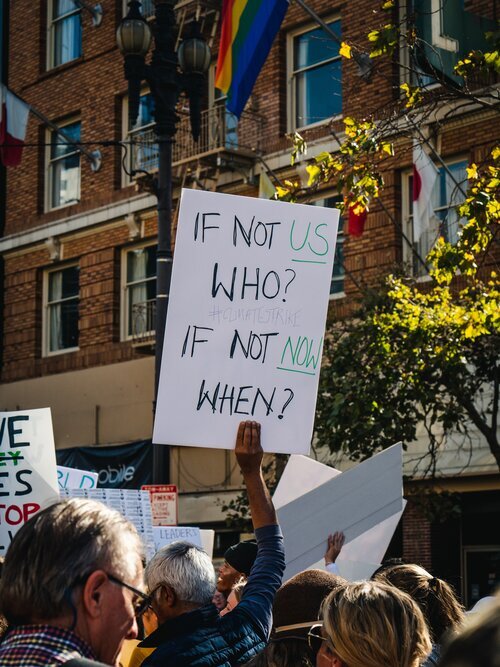Are You Part of the Problem or Are You Part of The Solution?
As with most either/or questions, the answer is, "Yes. Both."
If you're doing it right, you can recognize that you are both the problem and the solution. This is a necessary condition to be able to affect real change.
Back in the '60s (and still today), it was popular to say,
"If you're not part of the solution then you're part of the problem."
Photo by Jonathan Harrison on Unsplash
I get it. It definitely is problematic to not participate in solving problems, and it feels good to externalize life's problems - to focus on what you're doing right and what others are doing wrong. But this attitude is misguided and unhelpful, because it is at the core of cultural division and stagnation. It separates us and it undermines our capacity to make real change.
There is a more accurate, inspiring and insightful version of this quote, which I first heard from Adam Kehane in Collaborating with the Enemy :
"If you're not part of the problem then you can't be part of the solution."
This is provocative and powerful because it cuts straight to the heart. It shows that if we're not part of the situation then it's probably none of our business, and directs us to face and address our own role in any given problem if we hope of making change happen. I love how this concept points to a need for humility, born out of self-forgiveness, as a necessary precursor to any attempt to advocate for change. If you can accept that we are complicit and still choose to make a change, you gain freedom and agility and can become a model for those that you want to include in the transformation.
This leads to the 2nd of the Three Rules of Conflict that I've discovered. I want you to have a copy of the “Three Rules of Conflict” poster, Download here.
"Whoever is involved in the problem, must be involved in the solution."
To make any sustainable transformation you have to understand our interdependence. We are bound up with one another, and cannot expect to separate ourselves and find ways to work together for solutions.
Photo by Ronan Furuta on Unsplash
Here's how we get out of this sticky situation. The dichotomy of problem and solution is not about right and wrong; it's about better and worse. Any attempt to fix a problem is simply an effort to get out of a situation that is inadequate and move into a better one. Improvement is an infinite horizon and calls us into a journey ever forward together. To stop advancing would be our doom, and to leave anyone behind only delays our progress.
You may ask, "But what about all those other people who don't see it the way I do?" Well, they're going to have to come along too, and admitting that you're part of the problem too is an elegant way to make that easier and invite them along with you. You can try an approach that is inspired by polarity thinking (developed by Barry Johnson in his book Polarity Management):
1) Instead of focusing on what you're doing right and what the other person is doing wrong, start by lifting up the positive aspects of the other person or group's approach and admitting that you can see the shadow of your own approach. Acknowledge the truth you see in their concerns and cop to your own participation in the problem.
2) Then you can point out your concerns about the other person or group's approach to the situation, and show how the positive aspects of the solution you're offering can address those concerns. (Hint: In a polarized system, the negative aspects of one side are often solved by the positive aspects of the other side.)
3) Finally, ask to work with the other person to uplift the positives and support each other to downplay each other's negatives. Humbly, let them know that you want to be a team and that you can't do it without them.
The realization that we are part of the problem as foundational to creating solutions is revolutionary, and it is just the medicine we need today. It also requires a healthy dose of compassion and forgiveness (for you and them), which is also good medicine.
Photo by Santi Vedrí on Unsplash
In my most recent two podcast episodes, I talk with Tom Atlee about creating Wise Democracy and Ashanti Branch about raising conscious young men. Both participatory democracy and equitable gender relations are urgent causes today and they both demand of us to recognize our current roles in the ongoing troubles. They also invite us to boldly participate in the creation of transformative solutions.
Do you want to increase your capacity to participate in the transformation of a difficult situation in your life, workplace or community? Do you want help bringing all the voices into the room to find solutions to your collective problems?
Whether it's with your team at work, your political group or social movement, or in your personal day-to-day relationships, I am eager to help you, us, and myself recognize that we all have a role to play in the whole and to co-create a positive future.





